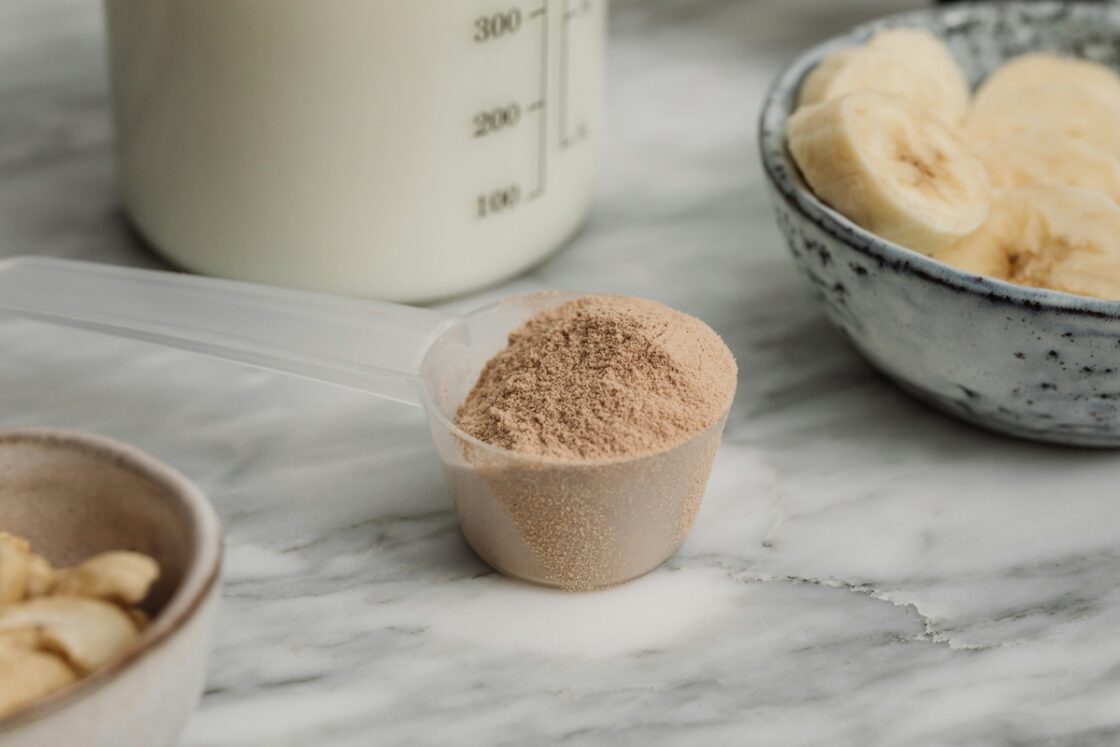
Protein is the macro du jour, if you ask health and wellness influencers. All over social media, personal trainers and registered dietitians are actively developing countless recipes where cottage cheese and puréed beans stand in for more traditional cream sauces and protein powder is stirred into cakes, cookies, and pancakes. And it’s not just those that run in wellness circles — in a 2024 survey of 3,000 adults, 71 percent said they were actively trying to consume more protein1.
Here’s what those influencers won’t necessarily tell you: an excessive intake of this essential macronutrient could end up having negative repercussions on your health.
But more isn’t necessarily better, when it comes to protein. Depending on your gender, age, and activity level, you may already be consuming enough.
And here’s what those influencers won’t necessarily tell you: an excessive intake of this essential macronutrient could end up having negative repercussions on your health.
Are We Eating Too Much Protein?
Protein is an essential building block of our bodies. Once ingested, it’s broken down into amino acids — many of which are essential to get from food, as the body cannot produce them on its own. These amino acids are used by the body to build or repair muscle, contributing to growth, gains, and continued well-being.
But eating too much protein can have negative health effects, notably on your kidneys. In 2024, researchers from Madrid published research in Sports Medicine indicating that high-protein diets could lead to eventual kidney failure, even in otherwise healthy people2.

The researchers highlighted the recommended daily allowance of .83 grams of protein per kilogram of body weight per day — about 55 grams of protein for a 150-pound woman. Since the average protein intake for Americans in 2015-2016 was 97 grams for men and 69 grams for women, it’s very possible that most people are eating enough (or even more than enough!) protein.
What Happens If You Eat Too Much Protein?
When we consume more protein than we need to repair our muscles and cells, the rest is typically burned to produce energy. But burning protein leads to the accumulation of a waste product known as urea, which must be filtered out of the bloodstream by the kidneys.
The more protein you eat, the more urea you produce, and the harder your kidneys will have to work to filter it out. Even healthy people see negative side effects of too much protein, according to 2020 research in the Journal of the American Society of Nephrology4. So is too much protein bad? Well, since 14 percent of U.S. adults are estimated to have chronic kidney disease, these effects are definitely worth keeping in mind5.
Other Risks of Protein Overconsumption
Kidney health isn’t the only potential side effect of consuming too much protein. According to 2016 research in Food & Function, chronic high protein intake (defined as more than 2 grams per kilo of body weight) could also lead to vascular abnormalities6.
Overconsumption of protein can also lead to weight gain7 or digestive abnormalities like constipation8 or diarrhea. It can even cause the development of harmful metabolites that can lead to gastrointestinal disorders9, particularly if a high-protein diet doesn’t also contain adequate fiber. And some studies have found that a higher intake of protein, particularly animal protein, could contribute to increased risk of breast cancer10 and type 2 diabetes11.
An Argument in Favor of More Protein

Not everyone is as wary of the risks of consuming too much protein. Carolyn Ketchum, author of the forthcoming The Protein Advantage, notes that while the bodies of younger adults use protein more efficiently, many experts believe that older adults may need a bit more.
“The loss of lean muscle mass begins in our thirties and increases exponentially over time,” she says, “and due to a phenomenon known as anabolic resistance, older adults need more daily protein to maintain the same amount of muscle as younger individuals.”
“[Daily protein recommendations] were never meant to be the optimal or target amount of any nutrient. Instead, it refers to the least amount an individual should consume.”
Carolyn Ketchum, author of The Protein Advantage
Daily protein recommendations, she continues, are an inadequate measure of the true intake of a given nutrient each individual really needs, seeing as they are generalized to the entire population, regardless of age, gender, and activity level. “It was never meant to be the optimal or target amount of any nutrient,” she says. “Instead, it refers to the least amount an individual should consume.” In other words, the question of how much protein you should eat in a day should be handled on an individual level.
She cites a growing body of research, including a 2023 research review in The Journal of Nutrition12 and a 2022 research review in Ageing Research Reviews13, that indicates that more protein — perhaps even double the amount currently recommended — could be a better target for older adults.
Indeed, higher daily protein intake has shown to reduce frailty in older women, according to 2011 research in the Journal of the American Geriatric Society14. A 2016 report in Food & Function indicated that while 1.6 g of protein per kg of body weight was ideal for people doing intense physical activity15, “Long-term consumption of protein at 2 g per kg BW per day is safe for healthy adults, and the tolerable upper limit is 3.5 g per kg BW per day for well-adapted subjects.”
Protein Isn’t a Magic Bullet

But even Ketchum notes that protein is far from the solution to all our ills. “It is human nature to want a magic bullet, the one thing that cures all the ills and solves all the problems,” she says. “Many people have a tendency to go overboard. Just increasing protein without considering your other nutrients or getting some exercise isn’t going to magically make you healthy and strong.”
She notes, on the contrary, that a high-protein diet must be coupled with exercise to reap the full benefits. “The relationship between protein consumption and physical activity is a highly synergistic one,” she says. “To engage in one without the other is addressing only part of the equation. Done in tandem, they create a positive feedback loop that helps maintain and even build lean muscle mass well into our sixties and seventies.”
How to Source Your Protein
The protein renaissance has led to a plethora of protein powders on the marketplace, offering a simple way to incorporate more of this nutrient into your diet. But while some protein powders are cleaner than others, on the whole, Ketchum is wary of an over-reliance on these highly processed sources of the macronutrient.
“There is nothing inherently wrong with protein powders, and they can help fill in any nutritional gaps when life gets busy,” she says. But she also notes that many are packed with sugars and additives. Some protein powders have even been found to contain heavy metals like lead. She recommends sourcing clean protein supplements and consuming them mindfully. “Use them in addition to, rather than as a replacement for, healthy high protein meals,” she says.

Instead, she recommends getting most of your protein from high-quality, whole food sources like meat, cheese, and eggs (which have recently been vindicated by the FDA to be included in the new definition of “healthy”). The best sources of protein tend to be natural. Plant-based protein sources like chickpeas, lentils, and beans have also been found to have less impact on linked health issues like increased risk of breast cancer and type 2 diabetes. Choosing your protein sources mindfully, and pairing protein with other essential nutrients like fiber and healthy fat, will lead to the best, most holistic dietary approach.
Sources:
- https://foodinsight.org/wp-content/uploads/2024/06/2024-IFIC-Food-Health-Survey.pdf
- https://pubmed.ncbi.nlm.nih.gov/39196487/
- https://www.ars.usda.gov/ARSUserFiles/80400530/pdf/DBrief/29_Protein_Intake_of_Adults_1516.pdf
- https://pmc.ncbi.nlm.nih.gov/articles/PMC7460905/
- https://www.cdc.gov/kidney-disease/php/data-research/index.html
- https://pubs.rsc.org/en/content/articlelanding/2016/fo/c5fo01530h
- https://www.clinicalnutritionjournal.com/article/S0261-5614(15)00091-6/abstract
- https://pubmed.ncbi.nlm.nih.gov/38651659/
- https://asm.org/press-releases/2024/june/high-protein-diet-impact-gut-microbes-body-comp
- https://pmc.ncbi.nlm.nih.gov/articles/PMC7768926/
- https://pmc.ncbi.nlm.nih.gov/articles/PMC6893550/
- https://www.sciencedirect.com/science/article/pii/S0022316623725297
- https://pubmed.ncbi.nlm.nih.gov/36087703/
- https://pmc.ncbi.nlm.nih.gov/articles/PMC2924946/
- https://pubs.rsc.org/en/content/articlelanding/2016/fo/c5fo01530h

